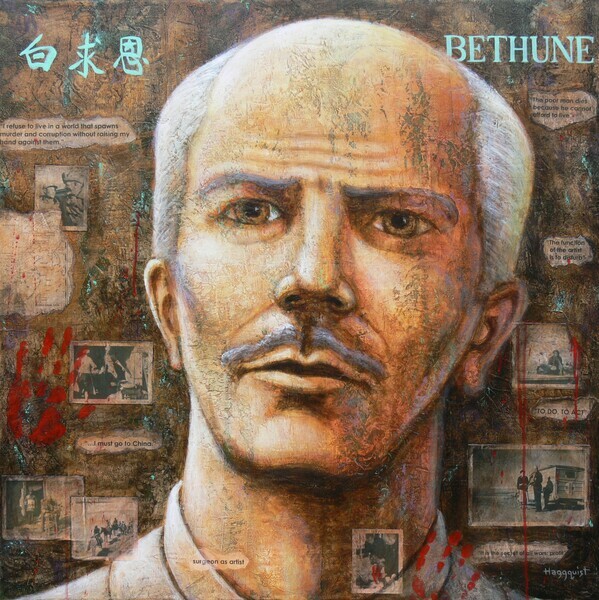| Home | | | Bio | | | Galleries | | | Prints | | | Artist Statement | | | Representation | | | Blog Archive 1 | | | Blog Archive 2 | | | Blog Archive 3 | | | Blog Archive 4 | | | Video | | | Photo Series | | | News | | | Mailing List | | | Links | | | Contact |
"Bethune", acrylic and collage on canvas, 36"x 36", 2008
Enjoyed painting this portrait of the famous Canadian doctor, Norman Bethune. Asai Wu Brandt of the Canadian International Exchange Society invited me to take part in a Bethune tribute exhibition with other artists from both Canada and China. This exhibit showed in Chilliwack BC before travelling to Beijing and showing at China's National Museum. Upon return to Canada, it showed at the Chinese Cultural Center in Vancouver BC. Since then it featured in an online article about a Bethune exhibit at the Canadian Science and Technology Museum in Ottawa in 2013. In 2014, upon a request from the Master of Bethune College at York University in Toronto, the image was used for promotional material for an upcoming symposium marking the 75th anniversary of Bethune's death.
For those not familiar with Norman Bethune I have provided a brief history.
Bethune was born in 1890 to a prominent Scottish Canadian family, whose origins can be traced back to an ancient order known as the Bethune/Beaton medical Kinderd who practised medicine in the classical Gaelic tradition, in the Highlands and Islands of Scotland from the Middle Ages to the Early Modern Era.
A complicated character, thought by some as arrogant, Bethune was a gifted surgeon, an artist and supporter of artists, a committed anti-fascist, and a pioneer of socialized medicine in Canada. Initially he served in World War I as a stretcher-bearer, later in the Navy and Air Force and after the war became a doctor. During the Great Depression, the plight of those who could not afford private medical treatment profoundly moved him, inspiring him to provide medical treatment free to the poor. He was also a leader in the treatment of tuberculosis and designed many of his own surgical instruments, some of which are still in use today.
As the forces of fascism began to rise in the early 1930's and the stage was set for global conflict once more, Bethune joined those who chose to stand and oppose fascism in the Sanish Civil War (1936-39.) In a fascist revolt, the forces led by General Franciso franco and aided by the military might of Nazi Germany and Fascist italy, attacked the democratically elected Republican Government of Spain. Bethune joined the thousands of internationalists from around the globe who aided the Spanish people defending what was known as the Second Spanish Republic. He set up a mobile blood transfusion unit (a first of its kind) which saved countless lives. Greatly affected by his experiences in Spain, he became openly critical of all the countries who stood by and did nothing.
Bethune then took his experience and energy to China to aid the Chinese in their war against the invading fascist forces of Japan. There he gained the respect and admiration of the Chinese people by living in the harshest of conditions, giving his own blood for transfusion, training many doctors, nurses, and orderlies, and performing heroic marathon surgeries where he treated many dozens without sleep. In November of 1939, while operating without gloves on a wounded soldier, Bethune accidently cut himself, contracted blood poisoning (septicemia) and died at the age of 49.


